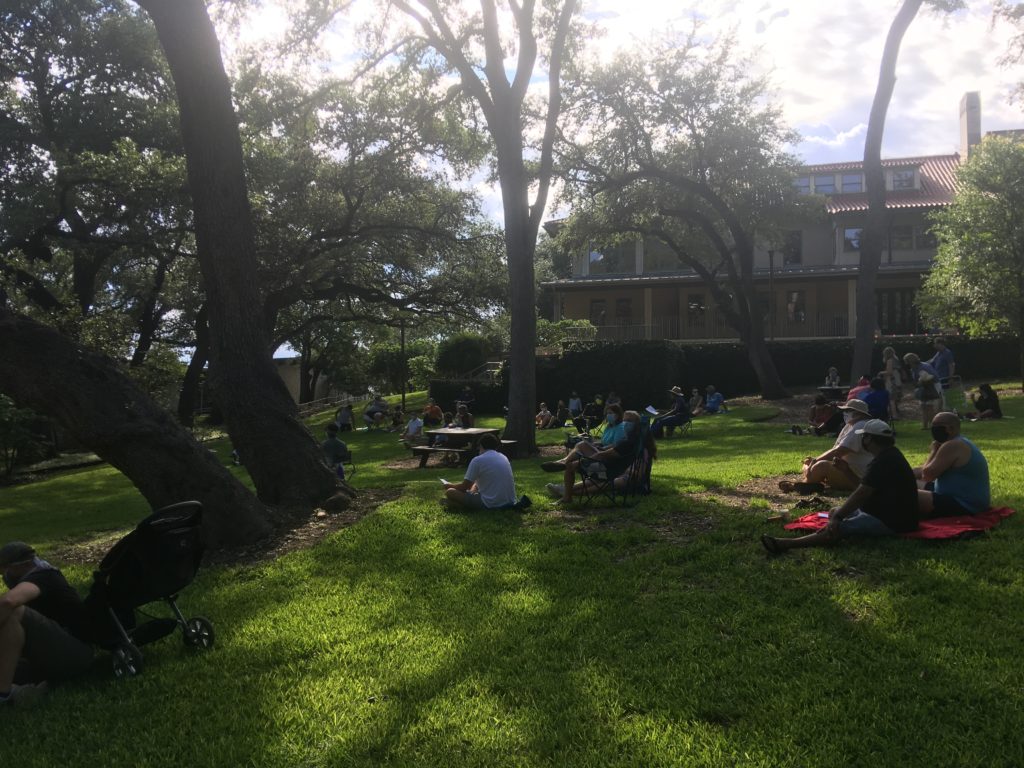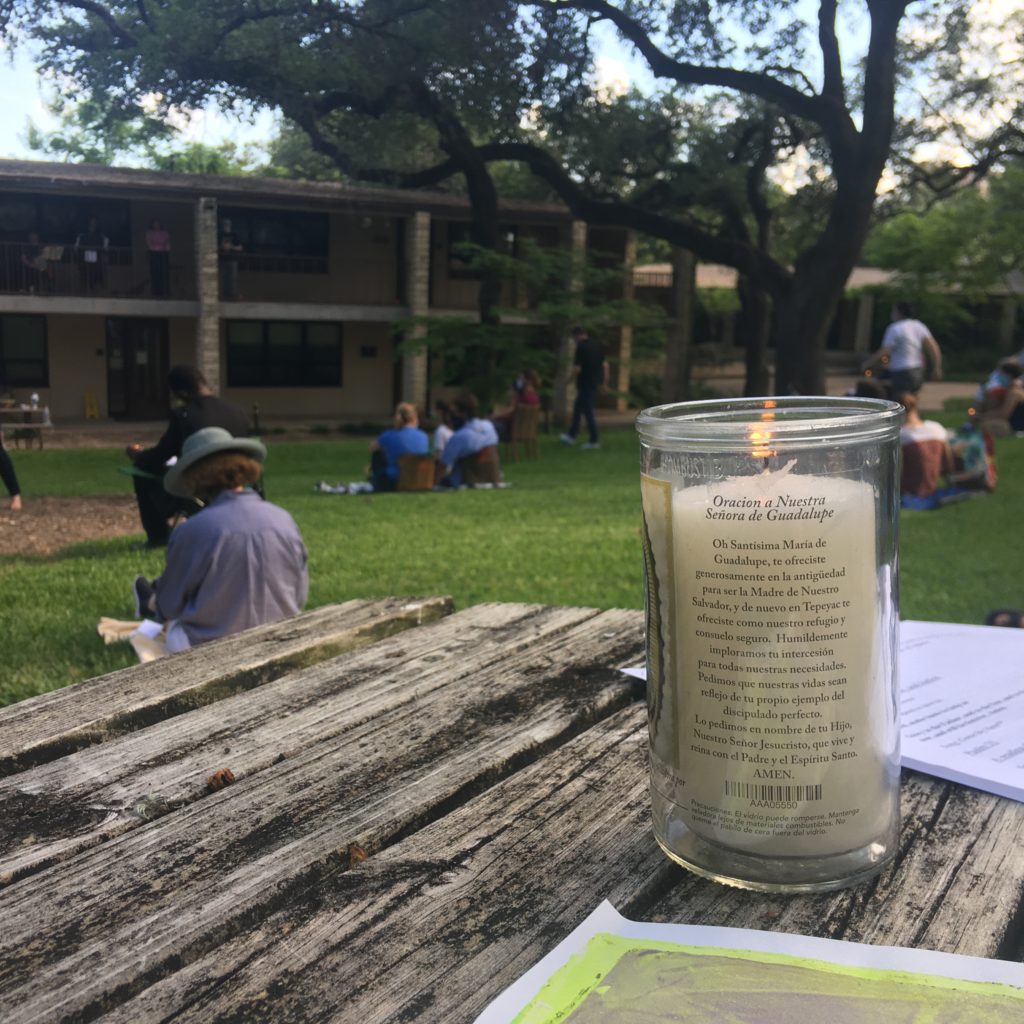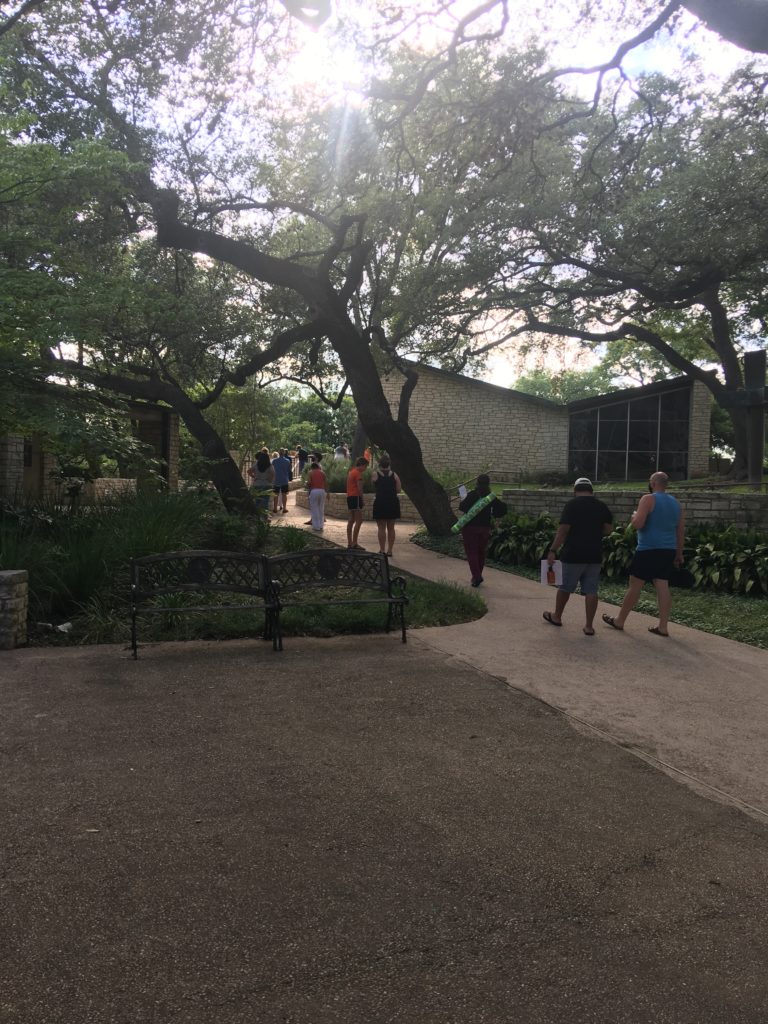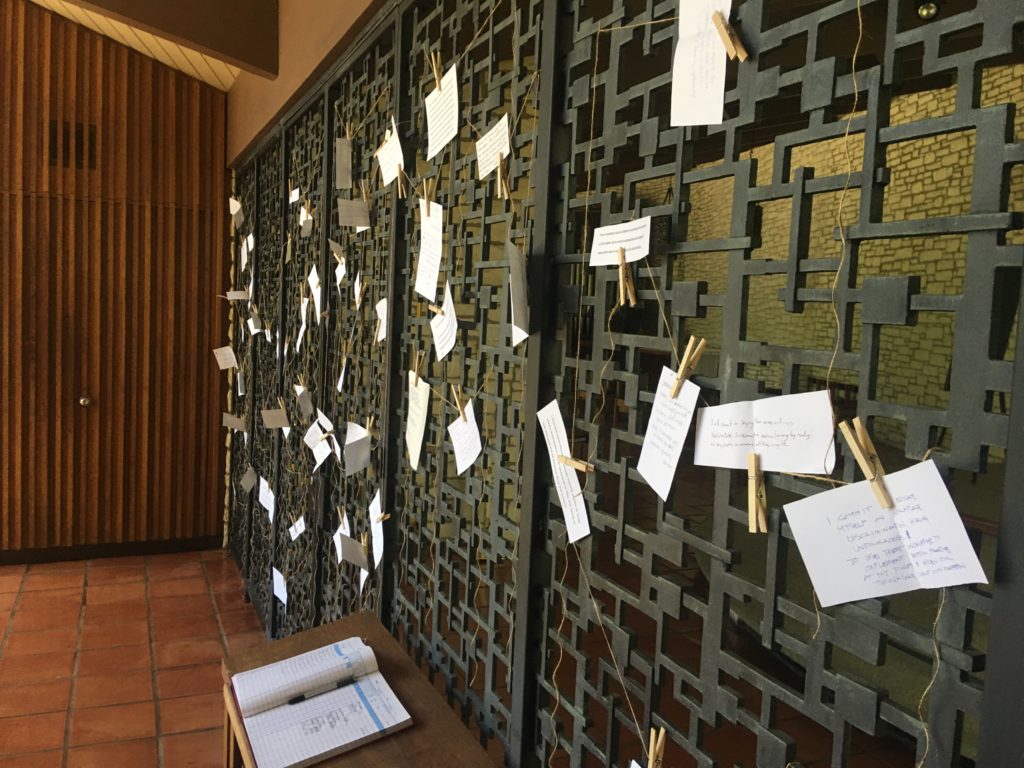On May 25, Minneapolis resident George Floyd, in handcuffs, was pinned facedown on the ground by a white police officer who pressed his knee against Floyd’s neck for more than eight minutes, killing Floyd. The outrage that followed – along with the recent killings of Ahmaud Arbery and Breonna Taylor – led to a global protest movement to confront the systematic racism that has caused the deaths of innumerable persons of color at the hands of the police in this country’s modern history.
As the community of Southwest had begun to disperse following the end of an unprecedented semester and graduation, the killing of Ahmaud Arbery, Breonna Taylor, and George Floyd rocked the nation and intensified the trauma for students of color in the community. Three rising MDiv seniors- all Black women seeking ordination within The Episcopal Church – spoke their pain and anger and expressed their frustration with the silence of their White colleagues. They saw an urgent need for action.
On Wednesday, June 3rd, the Seminary of the Southwest community gathered for the student-initiated Prayer Vigil of Vision, Witness, and Justice. A group of 81 people attended, wearing masks and spread appropriately among the large outdoor space. It was the first gathering of the community since March 13, 2020, when the seminary closed campus buildings due to the COVID-19 pandemic.

Attendees were led through a service of prayer, lit candles, and individually wrote their commitments to the anti-racist work they would each do moving forward. Attendees then affixed those commitments in the Christ Chapel sacristy, across from a display with the names of hundreds of persons of color who have been killed in racially motivated events.
“The killings of Ahmaud Arbery, Breonna Taylor, and George Floyd are the evil fruit of the sin of racism. The horrific consequences of white supremacy and my own complicity in it threatened to overwhelm and paralyze me. These three leaders in our community talked with me about the pain they were experiencing and their sense of abandonment by those with the privilege to avoid confronting these events. They shared the idea of a vigil, and they conceived, created, organized, and led the community in it. The communal lament we shared during that hour together on the Motte and the silent single pilgrimage to Christ Chapel to offer our commitments stand as a vivid expression of repentance and of Christian hope in the midst of many months of isolation, fear, and suffering. I am immensely grateful to Toni, Lindsey, and Megan for their courage and imagination in leading our community in the Vigil. I believe that it changed us, and I expect that our changing will grow in the days to come,” said the Very Rev. Cynthia Briggs Kittredge, dean and president.
The organizers, Toni Belhu, Megan Allen, and Lindsey Ardrey, sat with Eric Scott, Vice President for Communications, to share their experience:
How did the idea of holding the vigil begin?
Toni Belhu: Being a mother of three sons that are 24, and 26, I think what happened to George Floyd really hit me harder than everything else. That night, I wrote an email to Cynthia, and just shared how I was feeling about it, and asked if I could have a conversation, and later lead to a discussion with the community. My initial thought was to have discussions to get the community involved in it. I got together with several students, and we started brainstorming. That’s when Megan asked about doing something like a vigil.
For us to be three Episcopalian African American women in seminary – and I don’t think any other seminary has ever had that- for us to share that experience, and to bring it to the community is what I was thinking would be needed.
Megan Allen: We most certainly needed communal worship, a communal gathering. What we were thinking about is what would be something that the community as a whole would need, and could benefit from, and be encouraged from, taking into account the perspectives with what’s going on in the world, and the diverse body of students that we have.
I guess I ended up taking the lead on doing the planning, or the structuring of everything. I had already planned a similar vigil in my diocese a couple of years ago, in response to heightened ICE presence, raids, and detainment of immigrants, particularly in Ohio. My idea was to repurpose that so it would be a work smarter and not harder kind of deal. I ended up changing a lot. The thought process, and the planning through most of that, really did come from having conversations with the three of us and envisioning what would we need.

What was your experience organizing the event? How did it affect you?
Lindsey Ardrey: For me, I appreciated the collaborative effort. It felt more than collaborative. I love using the word ‘collective’, because it’s one body moving together. You can’t move the head without the feet coming along, too. At every step, we were checking in with each other. When one person was tired and exhausted from one thing, the other person would pick it up.
I am especially grateful for Megan stepping up, and saying, “I’m going to take the lead on this,” because I was utterly exhausted, and weary, and just all of the things. I appreciated being able to support her in it, and I think us working as a collaborative, collective, just really works, and not just in the organizing of it, but in promoting it, in telling people about it.
Then, there was real intentionality with each one of us having a piece of the liturgy. That encompassed the organization, the doing of it, the after part. All of it was the liturgy, and so each of us had this little part of it, a part of us represented within the liturgy.
Allen: It very much was creating something that I personally needed and perceived our community needed, and I recognized that truly is liturgy. The MDiv Middlers had just taken our Liturgy class, and so we had basically been spending our whole semester learning how to imagine a liturgy to curate an environment that invites a spiritual experience or encounter. We had prayers for the broader communities, but then if you noticed, there were prayers specifically for Black Indigenous People of Color, that would speak more for them. It was really important.
Something that I really appreciated about working with Toni and Lindsey, is we recognized each of our gifts that supported each other. Then we amplified them within each other, which made the work easy, because each of us were doing what came natural, or what we were interested in, and the other two of us would support that person in getting that part done.
I think that that’s just really important in collaborative work: amplifying the gifts that we know the other people within the group have. I think that also was an important part for me, as well.
When the community gathered on June 3rd, it was the first gathering since buildings were closed on the Southwest campus due to the pandemic. How did you personally experience the vigil? How did you witness others experiencing it?
Ardrey: When I heard everybody together, I almost had tears come, because I hadn’t really realized how much I had missed being part of a collective praying body. That just really hit me, and I had to pull myself together and be like, okay Lindsey, you still have the rest of this vigil that y’all have to guide along! That really hit me. I felt it in my body, and then my mind caught up.

Belhu: What really struck me was the young people there. If they knew their parents went somewhere, or they just came back home, they wouldn’t have experienced it. They could tell them about it, but they wouldn’t experience it. If they’re there watching their parents, they could really talk about it.
Allen: It was really powerful for me when we were doing the candle lighting, and watching so many people come up to get paper to write their commitments. The whole community got it collectively. That was a particularly impactful moment for me during the vigil.
Ardrey: We didn’t want it to be a regular, go to the church, you sit in the pew, you stand up when you’re supposed to, you sit down. You’re definitely not supposed to roam around. I was glad that we made that invitation at the beginning for people to walk to the front and write their commitments when the moment struck them, and people actually took to it.
Belhu: I love community. To me, church is community. Having 81 people there just really touched me. People were saying, “yes, this means something to me too, and I’m going to attend.” We have people that emailed us their prayers. Emailed saying, “I wish I could be there.” All over, people were with us, even if they weren’t physically present with us. I think that was really significant for me.
Allen: I do also have to say, the day after, I woke up so refreshed and so renewed in a way that I hadn’t in a while. Those kinds of things don’t always have words for them, but recognizing that there was something there for me that was 100% needed, my whole body was relaxed. That was when I knew that I had actually been able to submerge, because leading can often require a presence that doesn’t always feel like you can get fully swept up in the mystery, and when you’re in it, you don’t feel it all the time. At least, that’s my experience.

What do you hope the seminary community took from the vigil? What do you hope was learned?
Belhu: This was a way to actually do something that we’re called to do, and to take action. I’d love to see more of that. I think that being prayerful, and mindful, and being in community are things that are part of Southwest. That’s part of what I hope everyone takes with them to their parish, or whatever ministry they’re going to be doing, whether it was counseling, or spiritual direction. I think with this, I hope that they have a tool, that when something like this happens they can say, “I’ve been a part of something, and I know that this works, and this will help people to try to move forward.”
I think it’s easy to write a few lines, or share something from someone on Facebook. But actually being involved – Lindsey talks about embodiment and having your whole body – that’s how you know that you’re affected by it. Hopefully we can carry through and do more things like this going forward.
Allen: One of the things that gets missed a lot on campus is regular conversation about race and getting into the habit of encountering people who are different from you, and having conversations with them, whether it’s organized by the seminary, or just in our own community. I would hope that this vigil would encourage more regularity. I hear in Toni, when she reached out to Cynthia to have those conversations, this wanting for some kind of regularity, of acknowledgement of what’s going on in the world, how what’s going on in the world is impacting all of us here, because all of us are being impacted, although differently, and a desire for our community to really be engaged in, “doing the work.”
Well now there’s no excuse to not do anything, because now there is something that can be put in a file, and when some crazy stuff goes down, there is a form, or there is a way, or there is an example of a vigil that was really helpful for the broad community.
Ardrey: I was thinking about how lately people have grown cynical of, “our hopes and prayers are with you,” anytime something happens. That can be very vapid and shallow when something happens, oh yeah, hopes and prayers. I hope that with this vigil, we showed that it is okay to believe in prayer, and hope. It doesn’t need to be the only thing that you employ, but like what Megan was saying, it’s the foundation to leaping us into actually making transformative change.
Allen: I think for me, there is a hope that the vigil was not only spiritually comforting, but more so empowering of the idea that when we’re frozen by all of the emotions that we’re all feeling, there are things that we can do. Our small circles, we have a very large impact on our small circles. Sometimes you have to start there, and our community has to start in our community.
Ardrey: This is where we start, this is what we do. This is where we change our hearts, and then we take it, and we take it out into the world. Then we come back for the rejuvenation, for the energy of the collective.

